|
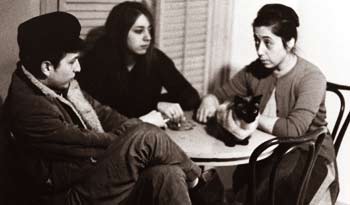
Imagine the echoes of applause
reverberating in the walls of an old café. The mind conjures ageless
melodies and envisions beat up hands dancing on the neck of an old
guitar. Throughout the history of American music these timeless places,
reminiscent of another era have always existed. Such places call to mind
ghosts of the past, creating a sense in a present day visitor that they
are stepping back into the far reaches of history. These cafes,
coffeehouses, and intimate listening rooms of America are far more
important than they initially appear; not only are they central
institutions in their own small communities, they are also of great
national importance. They play a central role in the politics and music
of folk culture since the early 1960s. These places seem to adapt to
their current time and place, beckoning new life into their deep corners
and darkened stages. They continue to exist because of the fundamental
desire of performers and audience to relate on an intimate level, to
share their stories and songs, their hopes, dreams, and sorrows, and to
keep alive the spirit of their communities.
Lena Spencer would be proud of the lasting spirit her eponymous
coffeehouse has brought to the community at large. In over half a
century, Caffé Lena, located in Saratoga Springs, New York and widely
recognized as the oldest continually operating coffeehouse in the United
States, has become an internationally renowned music venue. Since 1960,
the Caffé has provided seminal venues for such influential artists as
Bob Dylan, Bernice Johnson Reagan, Arlo Guthrie, Don McLean and Ani
Difranco. Many of America’s best-loved musicians owe much to its
longstanding tradition of showcasing a diverse array of up-and-coming
young artists. Caffé Lena is an American treasure. It possesses an
extraordinary history of innovation, multi-generational communication,
and support for musical expression that transcends the lines of race,
gender and class, merging art, culture, and social action. It is a
product not only of Spencer’s character, stemming from her own
upbringing in Milford, Massachusetts, but also of the 1960’s folk
revival movement which stemmed so strongly from New York and Boston.
Throughout its 45-year history, Caffé Lena has remained inextricably
tied to its Boston roots, and to similar clubs of its day, most notably
Club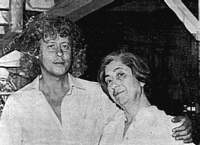 Passim in Cambridge, MA.
Passim in Cambridge, MA.
Lena Spencer, (1923-1989) was born Pasqualina Rosa Nargi on January 4,
1923 in Milford, Massachusetts to Italian immigrants. In her youth, Lena
Spencer spent weekends in New York City where she was introduced to jazz
music and theater. She performed with an amateur theater group in
Boston, worked for a Rubber Factory during WWII and later as a waitress
in her father`s restaurant. In her mid-20s she held a position at a
radio station where she met future President John F. Kennedy on his
campaign tour of Massachusetts. In 1958, Lena married Bill Spencer, a
part-time instructor and a student at the Boston Museum School of Fine
Arts. In 1959 Bill Spencer had the idea of opening a coffeehouse as a
moneymaking venture. The goal was to make enough money to allow the
couple to retire in Europe. On May 20, 1960, "Caffè Lena” was born in
Saratoga Springs, New York.
Although the couple chose Saratoga Springs as the site for their new
coffeehouse, (after Bill visited the town with one of his art students
during Skidmore’s family weekend) they maintained ties to their former
home of Boston, which would continue to influence Caffé Lena well into
its later years. Sarah Craig, Caffé Lena’s Manager since 1995 says,
“Caffe Lena was born out of New York's and Boston's folk scene. The
values of the wider movement – respect for folk tradition, simplicity,
the passing of music from person to person, sticking together – became
the core values of Lena and her Caffe. To this day, despite so many
changes in the wider world, we stay true that original spirit.” During
the first two years of Caffé Lena’s existence, Lena and Bill took weekly
trips to Boston and New York to scout out the latest folk talent for
their new venue. Mississipi John Hurt, Bernice Johnson Reagon, Jackie
Washington, and Hedy West were just a few early artists discovered by
the Spencers for this new “bohemian” coffeehouse in Saratoga. One of
Lena’s favorite performers, Dave Van Ronk was managed by his wife Terry
in the early ’60s. In 1962, when Bill Spencer left Lena to run the Caffè
alone, with the help of an extended family of volunteers, Lena Spencer
began to call on Terry for her help in
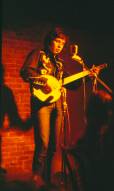 booking
the Caffé. This connection soon led to the booking of an unknown from
New York – a young man with a penchant for Woody Guthrie songs and a
harmonica tucked into his back pocket. A young man named Bob Dylan. booking
the Caffé. This connection soon led to the booking of an unknown from
New York – a young man with a penchant for Woody Guthrie songs and a
harmonica tucked into his back pocket. A young man named Bob Dylan.
In the early ’60s, while Bob Dylan was sleeping on Van Ronk’s couch and
performing to audiences at Caffé Lena, he was introduced by a
17-year-old Joan Baez to another influential folk coffeehouse, Club 47,
or what is now called Club Passim. (Incidentally, the number 47 seems to
recur in the folk world in a surprising number of ways: Club 47 was
located on 47 Palmer Street in Cambridge, Caffé Lena is located on 47
Phila Street in Saratoga Springs, and the Bitter End- a long-running
acoustic venue in New York City- is located on 147 Bleeker Street) At
the Club 47, Bob Dylan played between acts.
There are many similarities between the histories of Club Passim and
Caffé Lena, and the two intersect at various points in time. “Caffe Lena
could not keep roots music alive all on its own. There needs to be a
nationwide network of strong, excellent venues where people can share
their art,” says Craig. In 1958 when the Club 47 first opened as a jazz
venue, Lena and Bill Spencer were also contemplating hiring jazz
musicians for their club as Lena was a big jazz fan. In fact, in its first
years Lena frequently hired the great Jazz player Joe Venutti to
perform. The first few months were rocky for both clubs as they were
shut down by the local police, until growing groups of performers in
each respective city rallied and held their own hootenannies to keep the
music going. The strong communities such activities built around these
respective clubs remains to this day.
For over four decades, these legendary East Coast non-profit venues have
been known as premier places where new and established musical
performers are showcased. Both clubs claim to have produced a generation
of performers, festival organizers, and managers. Both were enormously
influential during the 1960s folk boom, and both claim important roles
in America's musical and cultural history.
One key element apparent in both venues is a long running strictly
no-alcohol policy. “We worry that to serve any alcohol would make it
harder to maintain the silence during shows so we've chosen against it,
despite the attraction of the revenue that it would bring in.” says
Craig. Other long-running listening rooms such as the Bitter End in New
York City, the Ark in Michigan, the Iron Horse in Massachusetts, and
Godfrey Daniels Coffeehouse in Pennsylvania all serve (or permit)
alcohol. A few, notably the Freight and Salvage in California and the
Swallow Hill Music Association in Colorado attempt to stay alcohol free
as a rule, occasionally purchasing a liquor permit for special events.
When asked how not serving alcohol changes the club’s atmosphere, Steve
Baker, Executive Director of The Freight & Salvage notes, "It triggers a
serious change in the nature of the club as a consequence; [a change] in
the composition of the audience. [With a no-alcohol policy] we end up
being more family-oriented...seeing three generations at once." Eryn
Hoerig, Front Desk Manager at the Swallow Hill Music Association agrees,
“There's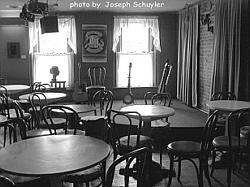 plenty of clubs that serve alcohol and music at the same time, but [by
not serving alcohol] we see it as a chance to set ourselves apart. It
makes us kid-friendly."
plenty of clubs that serve alcohol and music at the same time, but [by
not serving alcohol] we see it as a chance to set ourselves apart. It
makes us kid-friendly."
Another key element common to Passim and Caffé Lena that seems to set
them apart as premier listening rooms is their commitment to valuing
community over business. Torey Adler, the President of Caffé Lena’s
Board of Directors notes Lena’s influence in the character of the Caffé
when he says, “Lena was and continues to be the root of everything we
do. The only way to maintain what she started is to understand where it
all came from. If we forget Lena, we risk becoming just a business,
where music is exchanged for money. There are enough places like that
already.”
The main difference between the two clubs seems to be that in addition
to presenting folk music, the Caffé also has its very own internal black
box theater, and while Caffé Lena has never changed names or locations
in its 45 years, Club Passim began as the original Club 47 (1958-1968)
changed to Passim (1969-1994) and finally became Club Passim. “I became
aware of folk music when I lived in Cambridge. The excitement of those
earlier folk revival years was still in the air decades later,” says
Craig. “Passim kept the tradition going, but so did the wonderful street
musicians who busked night and day. I used to let my friend and employee
Garrett Dutton, now known as G. Love, leave work early to busk in a
doorway in the square.”
Both Caffé Lena and Club Passim remain small and intimate, where the
audience is close enough to feel as though they are part of the art.
“Sometimes we inherit folks when the commercial world has sidelined
them. Of course the experience of seeing them at Lena's versus [a larger
venue like the Saratoga Performing Arts Center] is like the difference
between seeing a play versus seeing a movie. Here it's intimate,
intense, interactive. You hear the intakes of breath, feel the vibration
of a foot keeping rhythm” says Craig. Club Passim Booking Manager Matt
Smith agrees, “[At these venues] performers are treated better by
staff/audience and also make more of a connection to the audience. It’s
hard to perform well when there's still a TV playing at the bar.” Both
Caffé Lena and Club Passim rely on members, donors, and volunteers for
support. One of Club 47's founding members, Betsy Siggins Schmidt
returned in 1997 as the club's executive director. Her protégé Smith
says, “[Caffé Lena and Club Passim] book many of the same acts, but also
have a strong local scene of folks who haven't quite gone
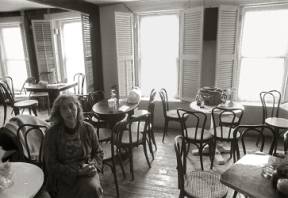 beyond
being regional favorites yet. We both respect the artists and try to
develop new talent.” beyond
being regional favorites yet. We both respect the artists and try to
develop new talent.”
The histories of both venues represent the growing significance of
grassroots folk music, and the 1960’s folk revival movement out of which
they were born and with which they are identified. “[The history of Club
Passim] is an integral part of what we do. We maintain that connection
to our past while still moving ahead to the future” says Smith. The
venues’ respective histories provide a view of a community-oriented
musical movement that began in the early 1960s and continues in these
same storied places to the present day. Adler notes, “The Caffé is
entirely a product of the ’60s folk movement. It wouldn't exist
otherwise. I think our current programming strategy is one which has
evolved organically from Lena's old schedules which grew out of her
awareness of and connection to the larger folk scene in the ’60s.”
The legacy of Lena Spencer continues today. Its neighbor Skidmore
College continues to feel Lena’s presence as much as her small Caffé on
Phila Street. In 1973, Lena helped local Skidmore College students found
student-run "Lively Lucy's Coffeehouse" which still exists today, and
annually hosts a spring Folk Festival. In the later 1970s, Lena had her
own radio show on Skidmore's WSPN called, "Lena's Open Door." In 1987
Skidmore College honored Lena with an honorary doctorate of humane
letters. Lena's on-screen debut as an actress came in 1987 when she
played a "a slatternly woman" opposite Meryl Streep in Ironweed, a
feature film based on the book by William Kennedy. The city of Saratoga
Springs honored her talents and contributions in 1987, renaming Hamilton
Alley "Lena Lane." On March 15, 1989, Lena was honored with the Saratoga
Arts Council's first lifetime achievement award. Over the years there
have been over seven Lena Spencer Days recognized by the city of
Saratoga Springs. The echoes of Lena’s legacy live on in the management
skills of its current director Sarah Craig and the non-profit board of
directors, which took over shortly after her passing. Craig says, “I
keep the core very similar to Lena Spencer's, but also keep my ear out
for new artists that are branching off from the roots in fresh ways.
These performers are intellectual geniuses, admirably independent, full
of determination, talent, courage. It's wonderful to have these people
in my heart as I go through life.”
In 2006 Caffé
Lena began moving towards a renovation campaign that will raise the
necessary funds to renovate the Caffé’s historic building and equip it
with handicap access. As the Caffé gets a much-needed facelift, its
archives are now being preserved through the Caffé Lena History Project,
which has recently joined forces with the American Folklife Center at
the Library of Congress to document the impact of Lena’s legacy on
America’s cultural history. “As a board member it is important to me
that we pass on what we know about Lena's Caffe in a way that endures
over the years, [and that] people who were close to Lena stay close to
the Caffe” says Adler. “I always hope that Lena would approve of how we
carry on her tradition. There is a heart to Caffè Lena. It's hard to
define what it is, but if it stopped, we would all know.”

- Jocelyn Arem
Jocelyn Arem: author,
songwriter, activist and cultural historian initiated the History
Project in 2003 to expand public awareness of the Caffé’s cultural
significance. In July 2005 she co-produced an exhibit with Board
President Torey Adler in honor of the Caffé’s 45th Anniversary. She is
currently compiling her research into a book on the Caffé’s history and
its impact on America’s musical heritage, which she hopes to have
published by the Caffé’s 50th anniversary in 2010.
For more information on
the history of Caffé Lena please visit the history project website at:
www.caffelenahistory.org. For current programming and a schedule of
upcoming events at Caffé Lena please visit:
www.caffelena.org
Photos
courtesy of Joe Alper, Joseph Deuel, Joseph Schuyler and:
www.caffelena.org
|